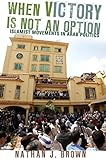When Victory Is Not an Option : Islamist Movements in Arab Politics / Nathan J. Brown.
Material type: TextPublisher: Ithaca, NY : Cornell University Press, [2012]Copyright date: ©2012Description: 1 online resource (272 p.)Content type:
TextPublisher: Ithaca, NY : Cornell University Press, [2012]Copyright date: ©2012Description: 1 online resource (272 p.)Content type: - 9780801477720
- 9780801463891
- 320.5 57 23
- DS39 .B76 2012eb
- online - DeGruyter
- Issued also in print.
| Item type | Current library | Call number | URL | Status | Notes | Barcode | |
|---|---|---|---|---|---|---|---|
 eBook
eBook
|
Biblioteca "Angelicum" Pont. Univ. S.Tommaso d'Aquino Nuvola online | online - DeGruyter (Browse shelf(Opens below)) | Online access | Not for loan (Accesso limitato) | Accesso per gli utenti autorizzati / Access for authorized users | (dgr)9780801463891 |
Frontmatter -- Contents -- Preface -- 1. Partially Political Movements in Semiauthoritarian Systems -- 2. Running to Lose? Elections, Authoritarianism, and Islamist Movements -- 3. Beyond Analogy Mongering: Ideological Movements and the Debate over the Primacy of Politics -- 4. The Model and the Mother Movement -- 5. The Model in Practice in Four Semiauthoritarian Settings -- 6. Can Islamists Party? Political Participation and Organizational Change -- 7. Ideological Change: Flirtation and Commitment -- 8. Arab Politics and Societies as They Might Be -- 9. Islamist Parties and Arab Political Systems as They Are -- Bibliography -- Index
restricted access online access with authorization star
http://purl.org/coar/access_right/c_16ec
Throughout the Arab world, Islamist political movements are joining the electoral process. This change alarms some observers and excites other. In recent years, electoral opportunities have opened, and Islamist movements have seized them. But those opportunities, while real, have also been sharply circumscribed. Elections may be freer, but they are not fair. The opposition can run but it generally cannot win. Semiauthoritarian conditions prevail in much of the Arab world, even in the wake of the Arab Spring. How do Islamist movements change when they plunge into freer but unfair elections? How do their organizations (such as the Muslim Brotherhood) and structures evolve? What happens to their core ideological principles? And how might their increased involvement affect the political system?In When Victory Is Not an Option, Nathan J. Brown addresses these questions by focusing on Islamist movements in Egypt, Jordan, Kuwait, and Palestine. He shows that uncertain benefits lead to uncertain changes. Islamists do adapt their organizations and their ideologies do bend-some. But leaders almost always preserve a line of retreat in case the political opening fizzles or fails to deliver what they wish. The result is a cat-and-mouse game between dominant regimes and wily movements. There are possibilities for more significant changes, but to date they remain only possibilities.
Issued also in print.
Mode of access: Internet via World Wide Web.
In English.
Description based on online resource; title from PDF title page (publisher's Web site, viewed 02. Mrz 2022)


